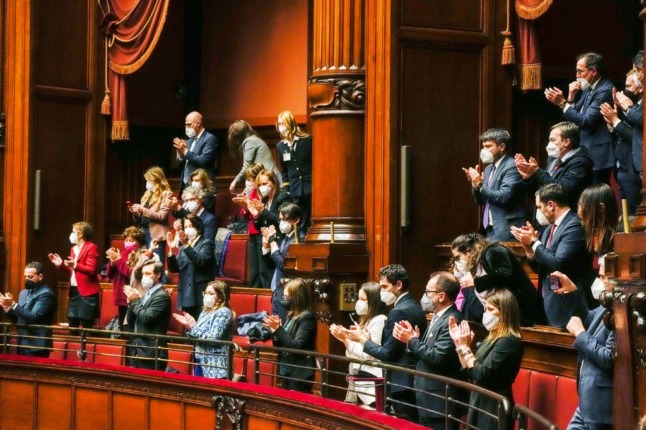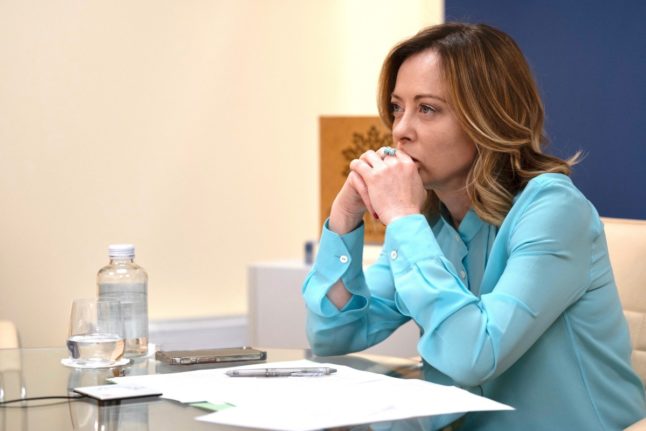Electing the 80-year-old ended weeks of hand-wringing over whether prized Prime Minister Mario Draghi should be elevated, with many fearing such a move would have left the government rudderless at a highly sensitive time.
Mattarella needed to pocket 505 or more votes. He won 759, earning him another stint as president in spite of himself.
The former constitutional court judge had repeatedly ruled out serving for a second term, but gave in Saturday after Italy’s bickering political parties failed to find another viable candidate.
“I had other plans, but if it’s necessary, I’m available,” he said before the vote, according to party parliamentary representatives.
He was expected to be sworn in on Wednesday or Thursday. Although many expect him to leave before the end of his new seven-year term, he is likely to stay at least past elections scheduled for 2023.
Constitutional expert Gaetano Azzariti earlier told AFP Mattarella’s election would be for the full seven-year term, but he could resign earlier.
Draghi said the result was “wonderful news for Italians”.
French President Emmanuel Macron was quick to tweet his congratulations to “dear Sergio”, while German President Frank-Walter Steinmeier hailed a “role model” who “understands the importance of Europe”.
Pope Francis hailed Mattarella’s “generous” agreement to stay on during a period of uncertainty caused by the coronavirus pandemic, which hit Italy hard.
Italy’s presidency is largely ceremonial, but the head of state wields serious power during political crises, from dissolving parliament to picking new prime ministers and denying mandates to fragile coalitions.
‘Ideal for financial markets’
Draghi, a former European Central Bank chief brought in to lead a national unity government almost a year ago, had been touted for months as the most eligible head of state.
But many feared his departure as prime minister would destabilise debt-laden Italy as it recovers from a lockdown-induced recession.
Italy is banking on almost 200 billion euros ($222 billion) in EU funds to cement the trend, but the money from Brussels is dependent on a tight timetable of reforms.
International investors have been watching the election closely, amid fears Draghi’s exit could undermine the whole programme.
Guido Cozzi, professor of macroeconomics at the University of St. Gallen, told AFP an extension of Mattarella’s mandate was “ideal for the financial markets”.
Draghi has also managed to keep to a minimum squabbling between Italy’s parties, almost all of which share power in his national unity government.
But the Repubblica daily pointed out that, with the campaign for the 2023 election already underway, the year ahead “risks being a replay of the shambles we’ve seen over the past few days”.
It will now fall to Mattarella to keep the peace: “a task more difficult than we can imagine”.
‘Big sacrifice’
Matteo Salvini, head of the far-right League party, was the first to openly propose the popular outgoing president Saturday, after putting forward a candidate Friday that flopped.
Billionaire Silvio Berlusconi, who took a failed shot at the presidency himself, also said his party would ask Mattarella “to make a big sacrifice”, as did the centre-left Democratic Party (PD).
Only the far-right Brothers of Italy party was against asking him to stay on.
A double mandate is not entirely unprecedented. In 2013, president Giorgio Napolitano was elected to stay on, in an attempt to resolve the political stalemate left by an inconclusive general election. He served nearly two more years.
Mattarella has already served a tumultuous seven-year term, during which he has sought to be a unifying figure through five different governments and the devastation of coronavirus.
The Sicilian, who was a little-known constitutional court judge when he was elected head of state by parliament in 2015, has been appreciated by parties across the political spectrum.
Mattarella is expected to stay in the post now for a least a year, to get the country through to the 2023 general election. That will also leave Draghi free to forge ahead with Italy’s post-pandemic recovery.



 Please whitelist us to continue reading.
Please whitelist us to continue reading.
He should be a steady hand st the helm of Italian politics.
He should be a steady hand at tge gelm of Italian politics.
He should be a steady hand at the helm of Italian politics.
He will be a steady hand at the helm of Italian politics.
He is a steady hand at the helm of Italian politics.